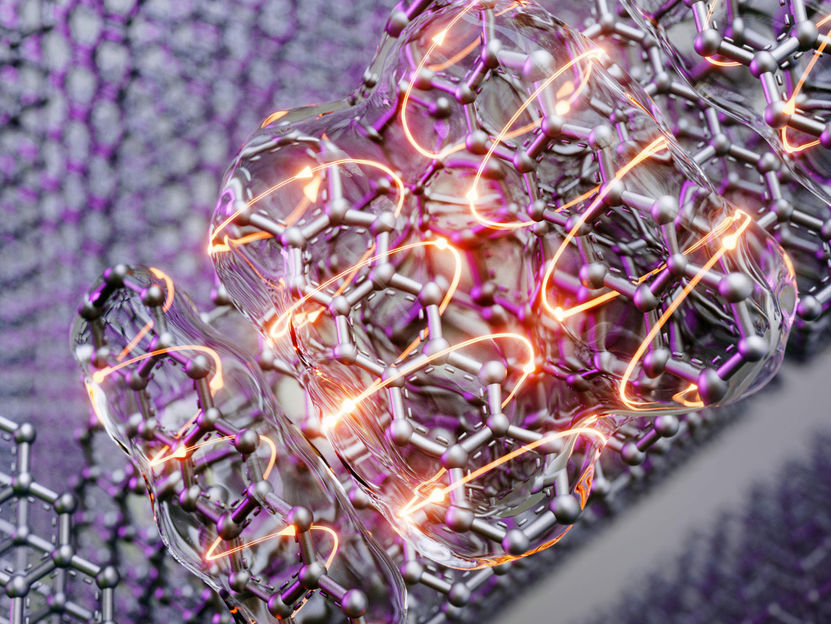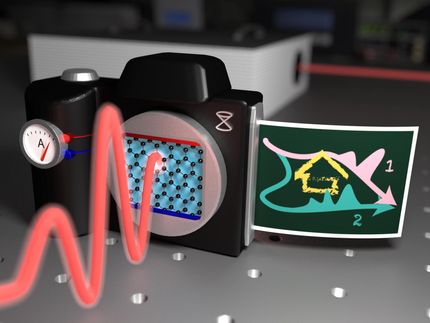Exciton fission – one photon in, two electrons out
Exciton fission could be extremely useful for high-efficiency photovoltaics
photovoltaics, the conversion of light to electricity, is a key technology for sustainable energy. Since the days of Max Planck and Albert Einstein, we know that light as well as electricity are quantized, meaning they come in tiny packets called photons and electrons. In a solar cell, the energy of a single photon is transferred to a single electron of the material, but no more than one. Only a few molecular materials like pentacene are an exception, where one photon is converted to two electrons instead. This excitation doubling, which is called exciton fission, could be extremely useful for high-efficiency photovoltaics, specifically to upgrade the dominant technology based on silicon. A team of researchers at the Fritz Haber Institute of the Max Planck Society, the Technical University of Berlin, and the Julius-Maximilians-Universität of Würzburg have now deciphered the first step of this process by recording an ultrafast movie of the photon-to-electricity conversion process, resolving a decades-old debate about the mechanism of the process.

Emergence of the bitriplet exciton in crystalline pentacene.
TU Berlin
”When pentacene is excited by light, the electrons in the material rapidly react,” explains Prof. Ralph Ernstorfer, a senior author of the study. “It was an open and very disputed question whether a photon excites two electrons directly or initially one electron, which subsequently shares its energy with another electron.”
To unravel this mystery the researchers used time- and angle-resolved photoemission spectroscopy, a cutting-edge technique to observe the dynamics of electrons on the femtosecond time scale, which is a billionth of a millionth of a second. This ultrafast electron movie camera enabled them to capture images of the fleeting excited electrons for the first time.
“Seeing these electrons was crucial to decipher the process,” says Alexander Neef, from the Fritz Haber Institute and the first author of the study. “An excited electron not only has a specific energy but also moves in distinct patterns, which are called orbitals. It is much easier to tell the electron apart if we can see their orbital shapes and how these change over time.”
With the images from the ultrafast electron movie at hand, the researchers decomposed the dynamics of the excited electrons for the first time based on their orbital characteristics. “We can now say with certainty that only one electron is excited directly and identified the mechanism of the excitation-doubling process,” adds Alexander Neef.
Knowing the mechanism of exciton fission is essential to using it for photovoltaic applications. A silicon solar cell enhanced with an excitation-doubling material could boost the solar-to-electricity efficiency by one-third. Such an advance could have enormous impacts since solar energy will be the dominant power source of the future. Already today large investments are flowing into the construction of these third-generation solar cells.
Original publication
Other news from the department science

Get the chemical industry in your inbox
By submitting this form you agree that LUMITOS AG will send you the newsletter(s) selected above by email. Your data will not be passed on to third parties. Your data will be stored and processed in accordance with our data protection regulations. LUMITOS may contact you by email for the purpose of advertising or market and opinion surveys. You can revoke your consent at any time without giving reasons to LUMITOS AG, Ernst-Augustin-Str. 2, 12489 Berlin, Germany or by e-mail at revoke@lumitos.com with effect for the future. In addition, each email contains a link to unsubscribe from the corresponding newsletter.



























































